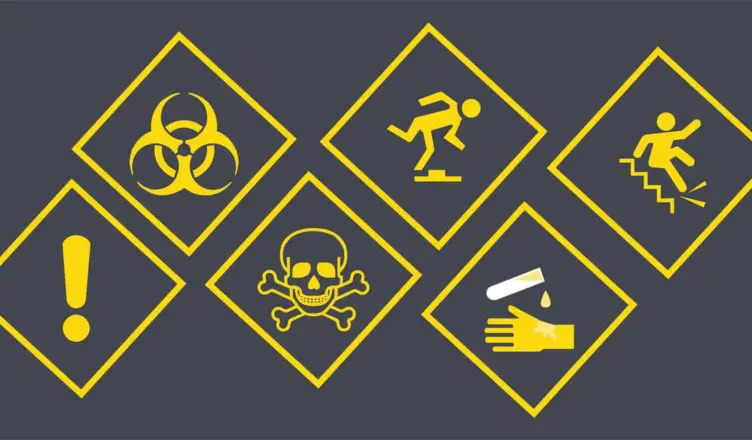Supply chain management is one of the world’s most critical infrastructures.
It is an important process of managing and coordinating the shipping of goods and services from a manufacturer’s location to a customer’s address.
Even during a global pandemic, this industry does not ground to a halt.
In fact, with more people staying at home, there is greater demand for goods ordered online as well as personal protective equipment and a forthcoming extensive vaccine rollout.
With that said, there are health and safety hazards that can exist in the supply chain industry which can lead to occupational accidents and serious injuries.
For example, common hazards include slips and trips, moving vehicles, manual handling, and falling objects.
It’s imperative that businesses and their employees do everything in their power to reduce risk.
Also, they ensure that health and safety measures are appropriately followed.
In this article, we will explain why health and safety is an important consideration in the global supply chain industry.
Why Health & Safety Is Important
The importance of health and safety, especially in the workplace, should not be understated. There are several reasons why it is important should be obvious.
Health and safety are defined as a series of ‘regulations and procedures intended to prevent accident or injury’. This impacts both working and public environments.
First and foremost, it’s about protecting the well-being of workers, customers, and site visitors.
Injuries as a result of accidents at the workplace can leave devastating consequences. The employee may experience severe pain, require medical care. They may endure a period of being unable to work, and suffer a loss of quality of life.
In the most serious of cases, it can lead to death which in return increases the impact on the victim’s family.
No one should want to be in a situation as a manager or supervisor where they have been partly responsible for a person’s injury.
Following an accident, there’s also the effect that this can have on your business. You may be required to pay damages and medical fees, you risk losing employees, your business reputation may be damaged. Even you could face legal prosecutions.
In the supply chain industry, health and safety are critical given that there is a wide range of health and safety hazards.
The process of storing and moving thousands of items in a warehouse, followed by transporting them across the globe, is no small task.
Heavy items, specialist equipment, and the use of vehicles are just three examples that can pose a threat. Accidents can lead to serious injury, may cause a loss in revenue, and could halt work from continuing.
How to Keep the Working Environment Safe
If it’s not already clear, it’s essential to make a workplace a safe place to work!
This is the responsibility of both the employer and its employees.
First of all, the company should have a healthy and safety policy that employees should receive and read through on their first day.
The policy should outline who is responsible for what, when, and how.
Of course, a health and safety policy is just the first step, and a legal requirement more than anything.
You have to show that you are putting your employer’s safety at the forefront.
Also, on a regular basis, you and your supervisors should make sure that procedures are being correctly followed.
There are several steps that you can take to keep your workplace safe. Some of which will depend on your individual operations and the unique hazards that exist in your environment.
You should aim to ensure that equipment works as intended, is inspected regularly and that employees are fully trained.
The environment should be kept tidy and free of debris and lose materials, and employees should be aware if they are dealing with objects containing hazardous materials.
Above anything else, you can keep your workplace safe and reduce liability by making sure health and safety inspections take place often. This will identify any weak points that need addressing.
What is LOLER?
In the UK, LOLER is one of the most significant measures that are in place to maintain health and safety in the workplace.
LOLER lays out a series of regulations about how lifting equipment should be used. It was introduced in 1998 as part of the government’s commitment to reducing the amount of lifting accidents that take place in a working environment.
LOLER requires that lifting equipment is well maintained and deemed safe to use. That lifting operations are only performed by trained and competent personnel.
Lifting equipment under LOLER can typically be described as any piece of equipment that is used for lifting items and personnel for the purposes of work.
This can include forklift trucks, cranes, commercial vehicles with tail lifts, recovery vehicles, refuse trucks, and so. It also applies to attachments that may be used to anchor or support the lifting equipment.
Undertaking Regular LOLER Inspections
LOLER inspections are a significant part of these regulations. An inspection is legally required to be carried out often based on a pre-determined frequency.
The frequency can depend on several criteria. Inspections every 6 months considered the most common one followed by 12 months. If a business doesn’t inspect equipment within this timeframe, then they will have fell foul of the regulations.
LOLER inspections can only be performed by a competent person.
He will assess whether the equipment is fit for its purpose and appropriately marked if correct procedures are being adhered to. And, if the equipment is being used by a suitable employee.
Finally
It is about making sure that equipment works safely and is operated by trained professionals.
If an accident happens and it’s determined that a business has broken the LOLER regulations, then serious consequences can be handed out.
Heavy fines, imprisonment, and disqualifications have been dished out to responsible business owners and employees.






